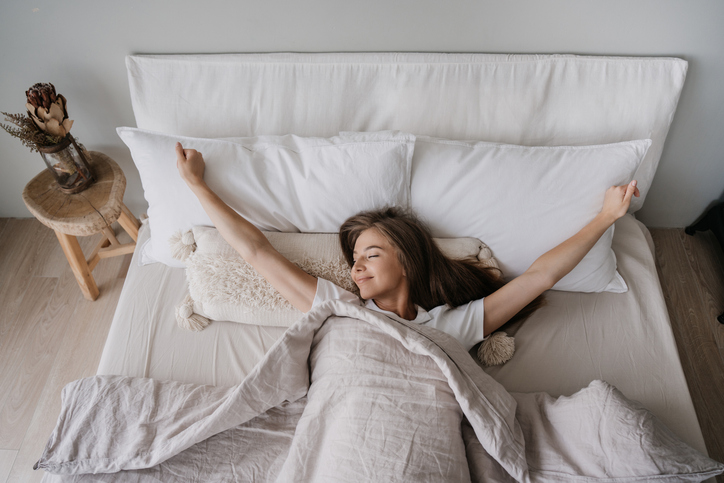If you snooze you lose…or maybe you don’t. Scientists have found that people who don’t sleep well are likely to see a negative impact on their mental and physical health. That’s why, at Carolina Dunes Behavioral Health in Leland, North Carolina, we encourage patients to practice healthy sleep habits as part of their self-care routine.
Types of Sleep Problems
Sleep disturbances can include several different issues:
- Difficulty falling asleep
- Inability to stay asleep
- Excessive daytime sleepiness/narcolepsy
- Sleep apnea
- Nightmares (these often get worse after a person experiences trauma or if they are in withdrawal from certain drugs)
- Circadian rhythm disruption
- Restless leg syndrome
Immediate Signs That Your Sleep Isn’t Sufficient
One study found that more than twice as many people struggle with insomnia now than prior to the Covid-19 pandemic. People who don’t sleep well often exhibit signs, which can include:
- Not feeling refreshed and alert when they wake up
- Struggling to focus on work, school, driving, and social interactions
- Dozing off while:
- Engaging in quiet recreational activities like watching TV, reading a book, or riding in a car
- Sitting in a work meeting or in class
- Talking to another person
- Sitting in traffic
The impact of insufficient sleep can be particularly pronounced for children, who may become angry, impulsive, moody, sad, or unmotivated.
Long-Term Consequences of Inadequate Sleep
If a person consistently struggles to get the sleep they need, their risk of physical health conditions increases. The risk for mental health concerns like depression, anxiety, bipolar disorder, and suicidal thoughts also increases; if they already have these conditions, their symptoms may become worse.
What Interferes with Sleep?
Many things can make it more challenging to slumber peacefully and restfully:
- Stress
- Travel
- Having a work schedule that is very late, very early, or shifts around a lot
- Spending too much time in front of electronic devices, especially in the evening or in bed
- Some medications
- Certain mental or medical illnesses
- Eating too much food too late at night
- Aging
Who is at Risk for Sleep Disturbances?
Everyone has trouble sleeping from time to time, but the following people are more likely to have recurring insomnia:
- Women
- Seniors
- People with medical diagnoses
- Individuals diagnosed with mental illnesses
- Anyone who is stressed
- People without a consistent schedule
The Importance of Sleep Quality
Not only do you need enough hours of sleep, but the sleep you get needs to be good quality. If you’re repeatedly woken up, your brain cannot move through all of the cycles involved in sleep, so you will not be as well-rested as you should be. Getting enough, good quality sleep leads to improved focus, better decision making, increased creativity, and improved learning.
How Much Sleep Do You Need?
The amount of sleep anyone needs is influenced by their age but can vary, even among people who are in the same age group. In general, the following guidelines apply:
- Teenagers – 8-10 hours
- Adults – 7-9 hours
- Seniors – 7-8 hours
How to Improve Your Sleep
If you’re struggling to get the sleep you need, there are steps you can take to improve your chances of getting better rest.
- Go to therapy if you’re lying awake worrying
- Consume a diet that is high in fiber, vitamins, and nutrients and low in saturated fat, sugar, and caffeine
- Meditate and utilize progressive muscle relaxation to help your mind and body gradually relax
- Exercise to help your brain create “feel good chemicals” and to make yourself tired
- Utilize light therapy in the morning to help your brain respond to darkness as a time for sleep
- Create a routine that involves avoiding naps, going to bed at the same time every night, and waking up at the same time every morning. You can also include activities that will signal to your brain that it is bedtime, including taking a bath, journaling, turning off electronic devices, and reading.
- Ensure your sleeping space is optimized for restful slumber:
- Only use the bed for sleep and sex
- Lower the lights and the noise ahead of bedtime
- Use blackout curtains or a sleep mask to block out light
- Keep the room cool and well-ventilated
- Invest in a comfortable mattress and pillows
- Keep pets outside of the bedroom if they wake you up at night
At Carolina Dunes Behavioral Health, we help our patients to learn a wide variety of ways that they can manage their mental health. This goes beyond therapy and medication to include a range of trauma-informed and evidence-based interventions.





